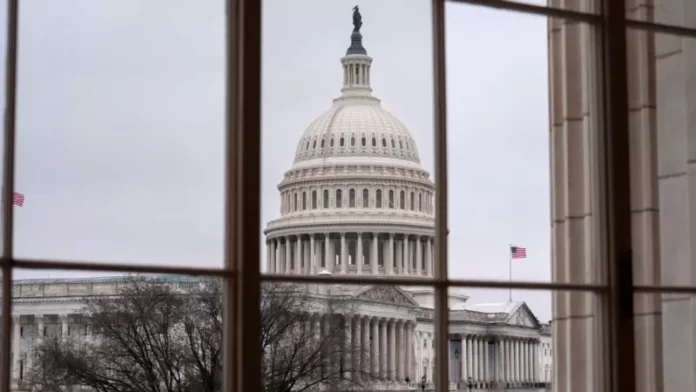U.S. lawmakers are back in the nation’s capital this week with a pressing deadline on their minds. The March 14 deadline to fund the government is quickly approaching and while progress has been made, there are still significant issues to be resolved.
The main challenges facing Congress are how to enact an extension of the 2017 tax cuts and how to address the U.S. deficit without cutting important safety net programs that benefit American voters. These are complex issues that require careful consideration and bipartisan cooperation.
President Donald Trump has made it clear that he wants Congress to pass a comprehensive bill that will not only extend the tax cuts but also serve as a key part of his domestic policy agenda. However, there are differing opinions on how and when to pass the tax cuts and how to pay down the deficit.
Despite Trump’s preference for the House version of the budget, the Senate passed a funding resolution on Friday that provides $150 billion for military funding and $175 billion for border security. This measure also avoids the controversial cuts to Medicaid that were proposed in the House version.
Senate Majority Leader John Thune stated on Monday, “Republicans are moving forward on legislation to fund continued efforts to deport criminal aliens, as well as provide other necessary resources to secure our border, discourage illegal immigration, and restore respect for the rule of law.” This funding resolution is a crucial step in ensuring the safety and security of our nation.
However, Senate Minority Leader Chuck Schumer sees things differently. He criticized the vote as a means to cater to the wishes of the wealthiest Americans, rather than addressing the needs of middle-class families. He stated, “They’re spending precious time trying to cater to the wishes of the absolutely richest people in America, instead of working to avoid a disastrous halt of services that help tens of millions of middle-class American families.”
The Senate’s decision to move forward with their version of the budget was due to uncertainty over the potential success of the vote on the House version. Both versions will need to be compromised in order to be signed into law.
The House is scheduled to hold a procedural vote on Tuesday, but Speaker of the House Mike Johnson holds a slim Republican majority and cannot afford to lose any members of his own party to pass his version of the budget.
Republican Representative Tony Gonzales led a group of seven other House Republicans in warning against potential cuts to important social safety net programs such as Medicaid and food assistance. In a letter to Speaker Johnson, they stated, “Slashing Medicaid would have serious consequences, particularly in rural and predominantly Hispanic communities where hospitals and nursing homes are already struggling to keep their doors open.”
Even some conservative Republicans have expressed concerns about the House version of the budget. Representative Thomas Massie, a member of the Freedom Caucus, along with several other undecided House Republicans, have not yet announced their votes on the measure.
Congressional Democrats also object to the Republican tax cut proposal, arguing that it will harm lower-income and middle-class Americans who are already struggling with the rising cost of living and inflation. In a letter to his colleagues, Democratic Leader Hakeem Jeffries stated, “Far-right extremists are determined to push through $4.5 trillion of tax breaks for wealthy Republican donors and well-connected corporations, explode the debt, and saddle everyday Americans with the bill by ending Medicaid as we know it. We must be at full strength to enhance our opportunity to stop the GOP Tax Scam in its tracks.”
President Trump took to social media to express his support for the House and Senate working together as a unified team. However, he also stated that he prefers the House version of the budget, as it aligns with his “America First” agenda. He emphasized the importance of passing a bill that includes all aspects of his agenda, not just certain parts.
If lawmakers are unable to reach a compromise by March 14, there will be a partial government shutdown. This would have serious consequences, leaving millions of federal employees temporarily without pay and suspending some non-essential government services. It is crucial that Congress works together to find a solution that benefits all Americans.
In conclusion, while progress has been made, there are still significant issues to be resolved as Congress works to fund the government beyond the March 14 deadline. It is important for lawmakers to put aside their differences and work together in a bipartisan manner to find a solution that benefits all Americans. Let us hope that they can come together and pass a budget that addresses the needs of the American people while also promoting economic growth and stability.

